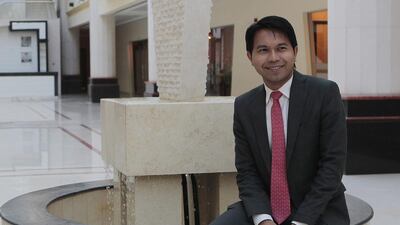ABU DHABI // Lawyers who run a free legal advice service for Filipinos have warned that serving a prison term or paying a fine does not mean their debts are negated.
“Banks are becoming more aggressive in filing civil cases against loan defaulters,” said Michael Almazar, 32, director of the commercial department at Gulf Law in the Middle East, the UK and in the Philippines.
“Most defaulters think that if they pay the fine or serve a jail term their debts will be erased, which isn’t the case.”
Lawyers at Gulf Law have been working with the Philippine embassy and consulate in the UAE to raise awareness about civil, criminal, immigration and labour-related issues.
Since January, the firm has provided free legal assistance to 1,500 Filipinos during its monthly legal aid clinics at the embassy in Abu Dhabi and consulate in Dubai.
Of those, more than 50 per cent were debt-related cases.
“Issuing a bounced cheque is a criminal offence and that payment of a fine or serving a jail term will only release their criminal case,” said Mr Almazar, a Dubai lawyer who holds a UAE legal consultancy licence.
“The bank still has the right to recover payment through a civil case.”
Banks have also started requesting with the authorities to issue a travel ban against debtors who do not have any intention to pay in the first place, he said.
“These borrowers think they are wise and can play with the system,” Mr Almazar said.
“One Filipina had applied for a credit shield to insure her credit card. Then she intentionally spent her credit limit and resigned from her job, thinking that the insurance would cover her obligations.”
“Little did she know that loss of work due to voluntary resignation is not covered by insurance. Now she does not have a job and the bank has filed a case against her for issuing a bounced cheque.”
The law firm normally assists debtors by negotiating with their banks and helping them to secure a repayment scheme.
“Sadly, the banks would show us their previous records,” Mr Almazar said. “We can no longer help them since they’ve lost their credibility after several repeat offences.”
He and his team of lawyers have handled cases involving women getting pregnant out of wedlock.
There are also workers with employment bans, or complaining of delayed wages, or who have not paid their gratuity and other benefits.
They also help those who bought visas from sponsors or brokers to enable them to work in the country.
“We assisted someone who had paid more than Dh20,000 for a visa,” Mr Almazar said.
“She had a servant’s visa which was guaranteed to be renewed for the next five years. But she found herself in jail after less than a year because the sponsor filed an absconding case against her.”
In February, The National reported the case of a woman who paid Dh10,000 to a Filipina receptionist for a visa. She approached Gulf Law to help recover it as the broker did not apply for the visa.
Expatriates should be aware of the risk of buying a visa that is illegal in the UAE, Mr Almazar said.
Anyone found to be living or working in the UAE illegally faces fines of Dh100 a day for visa offences and Dh25 a day for residency offences.
The Ministry of Interior can also impose a fine of Dh50,000 on any company or individual found to be employing workers illegally.
“Unscrupulous individuals will offer their sponsorship for a servant’s or a driver’s visa,” he said.
“When they reach their maximum visa sponsorship allocation, they report those under their sponsorship as runaways so they can sponsor new servants or drivers.”
rruiz@thenational.ae

